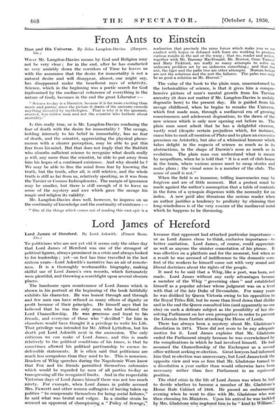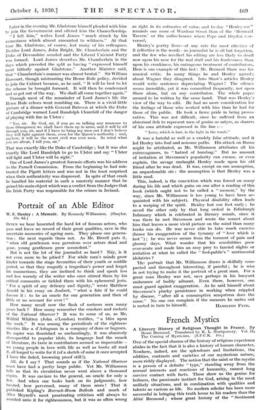Lord James of Hereford
To politicians who are not yet old it seems only the other day that Lord James of Hereford was one of the strongest of political figures, always prominent in a crisis and always looked to for leadership ; yet—so fast has time travelled in the last sixteen years—Lord Askwith's narrative has an air of remote- ness. It is a thoroughly workmanlike biography, making skilful use of Lord James's own records, which fortunately were plentiful, and throwing a searchlight upon several obscure places.
The handsome open countenance of Lord James which is shown in his portrait at the beginning of the book faithfully exhibits his character. He was honest through and through and few men can have refused so many offices of dignity or profit because of their principles. He himself says that he believed that he was the only man who had refused the Lord Chancellorship. He was generous and loyal to his friends, and everyone of those who " devilled " for him in chambers would have thought it a privilege to write his Life. That privilege was intended for Mr. Alfred Lyttelton, but his death put Lord Askwith next in the succession. The only Criticism we can make of Lord James, and this is made relatively to the political conditions of his times, is that he sometimes allowed his political partisanship to excuse in- defensible statements. It is, often said that politicians are much less scrupulous than they used to be. This is nonsense. Readers of Whig speeches during the Napoleonic Wars know that Fox and his friends permitted themselves calumnies which would be regarded by men of all parties to-day as transgressing all the recognized limits. And in the respectable Victorian days of Lord James himself there was not too much nicety. For example, when Lord James in public accused Mrs. Fawcett and other women suffragists of having taken up politics "to compensate themselves for being social failures," he said what was brutal and vulgar. In a similar strain he accused an opponent of championing a "Policy of Sewage," because that opponent had attached particular importance-- or as Lord James chose to think, exclusive importance—to better sanitation. Lord James, of course, could appreciate as well as anyone the sinister connotation of his phrase. It was effective on a platform and for the moment, but when as a result he was accused of indifference to the domestic com- fort of the workers he himself came out with very sound and liberal doctrines about the rights of the people.
It used to be said that a Whig, like a poet, VMS born, not made. Lord James without any early advantages became a member of the Whig "governing class" and established himself as a popular adviser whose judgment was on a level with that of the late Duke of Devonshire. For many years he was disliked by Queen Victoria owing to his opposition to the Royal Titles Bill, but he more than lived down that dislike and in the end the Queen consulted him (and apparently no one else) on such a delicate subject as the possibility of her dis- solving Parliament on her own prerogative in order to prevent the Liberals from further attacking the House of Lords.
There has always been a mystery about Mr. Gladstone's dissolution in 1874. There did not seem to be any adequate motive for it. Lord James explains that Mr. Gladstone ended the Parliament simply because he was overwhelmed by the complications in which he had involved himself. He had assumed the Chancellorship of the Exchequer as a second office without seeking re-election. Great lawyers had informed him that re-election was unnecessary, but Lord James took the opposite view and was so firm that Mr. Gladstone turned to a dissolution a year earlier than would otherwise have been necessary rather than face Parliament in an equivocal position.
The chief crisis in the life of Lord James was when he had to decide whether to become a member of Mr. Gladstone's Home Rule Cabinet of 1886. He passed an embarrassing evening when he went to dine with Mr. Gladstone who was then choosing his Ministers. Upon his arrival he was tackled by Mrs. Gladstone who implored him (o he " kind I° William2.!
Later in the evening Mr. Gladstone himself pleaded with him to join the Government and offered him the Chancellorship.
" I left him," writes Lord James "much struck by his earnestness which almost amounted to wildness." At that time Mr. Gladstone, of course, lost many of his colleagues. Besides Lord James, John Bright, Mr. Chamberlain and the Duke of Devonshire seceded and the Liberal Unionist Party was formed. Lord James describes Mr. Chamberlain in the days which preceded the split as having "expressed himself most bitterly against Gladstone." Another Minister said, that" Chamberlain's manner was almost brutal." Sir William Harcourt, though mistrusting the Home Rule policy, decided to join the Cabinet because, as he said, " It will be best to let the scheme be brought forward. It will then be condemned and so got out of the way. We shall all come together again."
Through most of the remainder of Lord James's life the Home Rule echoes went rumbling on. There is a vivid little picture of a dinner with General Bateson at which the Duke of Cambridge warned Lord Randolph Churchill of the danger
of playing with fire in Ulster : •
" Yes, sir. By God, sir, if you go on talking any nonsense to those Orangemen we shall have them up in arms, and it will be all through you, sir, and if I have to bring my men out I don't believe they will fight against them, oven for the Queen's authority ; and, anyhow, it will be the worst civil war ever seen. Bo mind what you are about, I tell you, sir."
That was exactly like the Duke of Cambridge ; but it was also exactly like Lord Randolph to go to Ulster and say "Ulster will fight and Ulster will be right."
One of Lord James's greatest forensic efforts was his address to the Parnell Commission. From the beginning he had mis- trusted the Pigott letters and was not in the least surprised when their authenticity was disproved. In spite of that crash he handled his material in such a masterly manner that he gained his main object which was a verdict from theJudges that the Irish Party was responsible for the crimes in Ireland.





















































 Previous page
Previous page